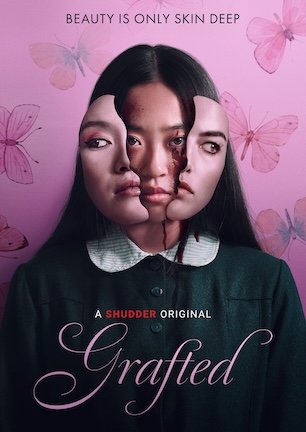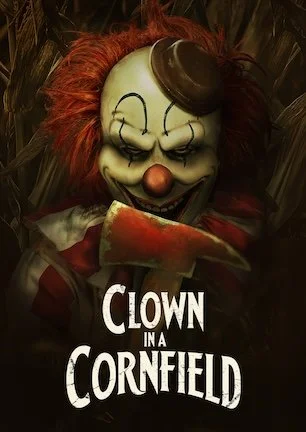Studio: Shudder
Director: Sasha Rainbow
Writer: Mia Maramara, Hweiling Ow, Lee Murray, Sasha Rainbow
Producer: Murray Francis, Leela Menon
Stars: Joyena Sun, Jess Hong, Eden Hart, Jared Turner, Sepi To’a
Review Score:
Summary:
Deadly consequences follow a gifted college student who continues her father’s research on a strange skin graft formula to fix a hereditary deformity.
Review:
When she was a child, Wei watched her scientist father tirelessly toil to develop a skin graft formula that could cure them both of a rash-like facial deformity. Wei also witnessed the experiment’s horrifying failure, as the living tissue he created spread across her father’s face until he suffocated, despite his daughter furiously slashing at him with a scalpel.
Now a college student dedicated to completing her father’s research, Wei is on her way to New Zealand to attend university on a science scholarship. Wei’s mum is anxious to get the girl out of China, where her appearance makes her “a monster.” Living with her materialistic aunt and socialite cousin Angela, Wei doesn’t fare any better at making friends. Angela and her gossipy gal pals shun Wei for being unsightly, and for having unfamiliar customs with cultural cuisine they consider gross.
When she’s not having her self-esteem shredded, Wei spends time in a lab where her biochemistry professor suspiciously licks his lips over the project she’s passionately working on. After uncovering the missing link in her father’s formula, Wei finally finds a way to fix her face. But she’s going to do more than that. She’s going to take on other faces entirely as a domino line falls that has Wei butchering bodies and pretending to be other people, all in the name of being seen as the beauty she has always wanted to be.
Whether the film likes it or not, and it probably does not, director Sasha Rainbow’s “Grafted” invites obvious comparisons to Coralie Fargeat’s “The Substance” (review here). Both tell stories of appearance-absorbed people assuming alternate personalities preferred over their own. Both bite on social commentary about image obsession, with a specific emphasis on how imaginary ideals impact women. And although “Grafted” does it to a lesser extent, both are framed as frightening fairy tales rather than ripped-from-the-headlines realities.
Being a movie about appearances, “Grafted” intentionally uses appearances to identify people and their purposes without requiring much verbal background. Unintentionally, this technique telegraphs the plot’s path partly through the nature of how characters are presented visually.
Take Wei’s professor, Paul. From the first time we see his slick hair, tailored suit, and square jaw, everything about him suggests he’s too put together, too handsome to be an ordinary science slob. And even before we see him frustrated by the news his cancelled research is no longer being funded, his furrowed brow, sly smirk, and firm grab at Wei’s notebook announce Paul’s clear intention to steal the work as his own.
It comes as no surprise to learn Paul is secretly having sex with his student Eve, Angela’s attractive friend who doesn’t take kindly to competition for the older man’s affections. With her blonde ponytail tied back tightly, a pink collar folded over a midriff-baring sweater, and arms often folded at her chest, everything about Eve sends signals of her being prissy, pouty, and posh.
Dressing everyone like this fits “Grafted’s” design as a fable-like metaphor for the desperate difficulties of finding acceptance by pretending to be someone you’re not. Amid the lowkey quirks of this weird world, which can occasionally tease too much silliness such as whenever a nosy neighbor distractingly shakes up the tone, Wei rolls a runaway snowball into an avalanche of body parts whose increasingly complicated consequences would make William Gaines and Al Feldstein proud. During this time, performers playing two roles do convincing work selling themselves as Wei awkwardly imitating them while wearing their faces. Acting eclipses bits of body horror, which are in shorter supply than some might expect, and not always as skin-flinchingly gruesome as perhaps they should be to reflect everyone’s repulsions.
I can’t help but think Wei’s motivation might make more sense if her insecurity was caused by a truly revolting disfigurement rather than a regrettably located birthmark. Maybe I’m missing part of the point. Maybe the movie means to illustrate how minor blemishes can be pettily perceived as major offenses. But other women treat Wei like she’s Medusa, and you might turn to stone if you can stomach looking at her, when the reality is the discoloration on one side of her jaw isn’t that big of a deal.
Not going far enough rocks the film’s rhythm. “Grafted” flattens out at its ending because a muddled moral leaves it with nowhere unique to go. Should the takeaway be that vanity is bad? Is it as simple as don’t kill people? And who’s learning the lesson, Wei or the victims who morphed her from an imaginary monster into an actual one?
Far from being the film’s fault for releasing only a few months later, it’s unfortunate “Grafted” trails in “The Substance’s” shadow because it’s difficult to divorce the unfair association of it being a lower-budgeted take on topics that were satirically sharper as well as more splattery in its Oscar-nominated big sister. That’s meant more as praise for “The Substance,” not as a dismissively derisive assessment of “Grafted.” “Grafted’s” talented cast and creative crew craft a noteworthy debut for Sasha Rainbow’s first feature. Fingers are crossed Rainbow’s next effort doesn’t have the problem of parallel thinking so it can stand taller on its own two feet.
Review Score: 70







“Strange Harvest” echoes “The Poughkeepsie Tapes” in a manner that’s able to maintain its own originality despite the déjà vu.